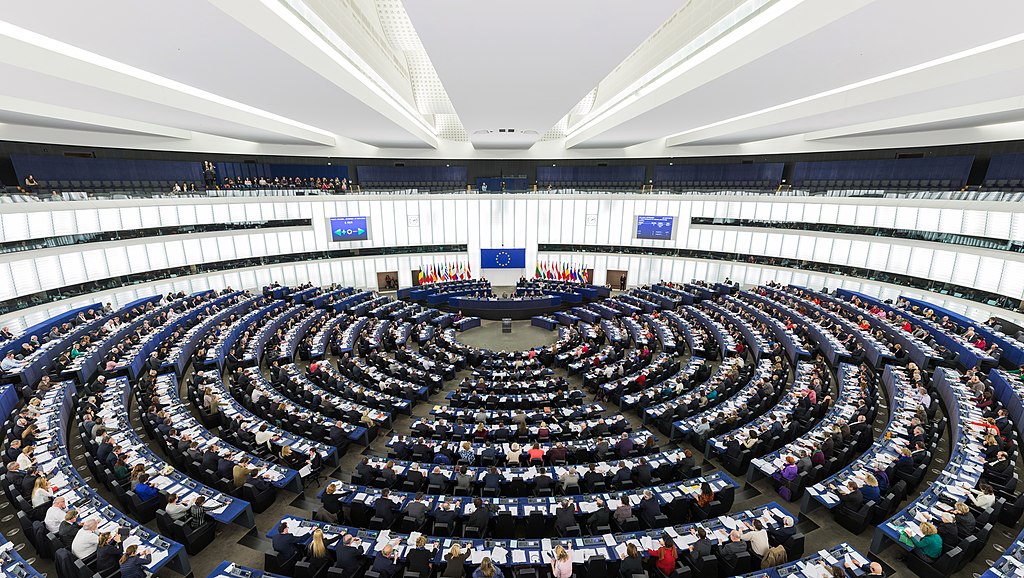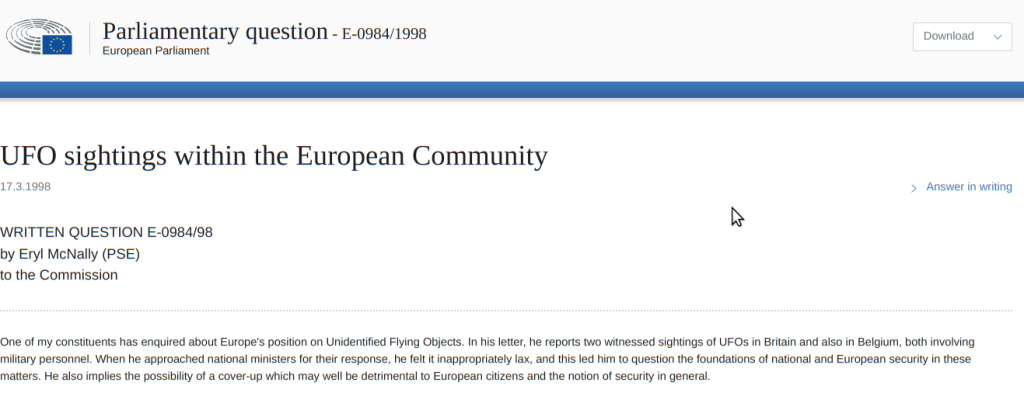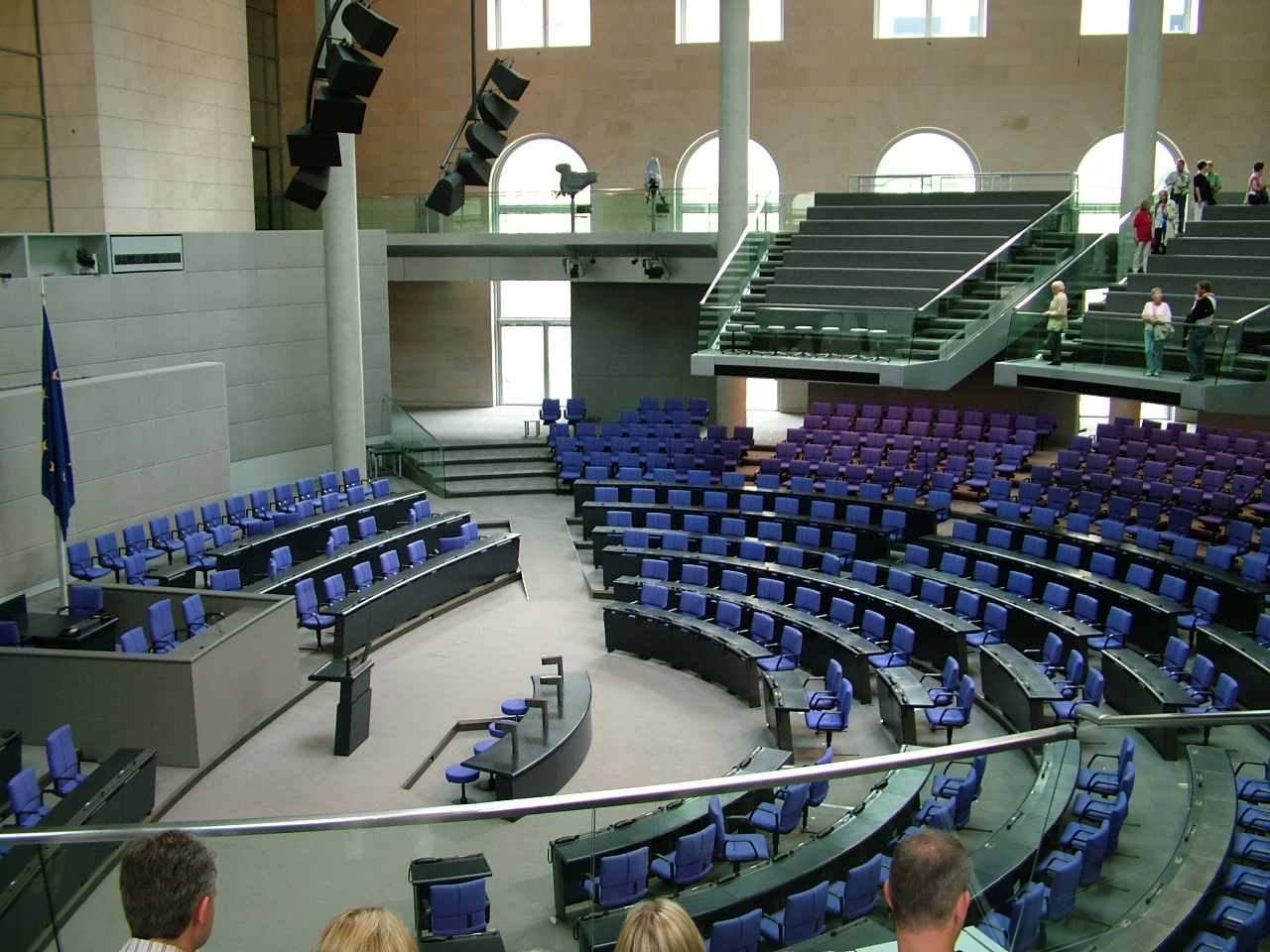(continuing from Part 1)
Parliamentary questions
Question from January 31, 2024
The most recent question is from January 31, 2024, in which MEP Francisco Guerreiro (Verts/ALE, Portugal) refers to the intended new EU space law, which provides for “common EU rules on the safety, resilience and sustainability of space activities and operations”. Guerreiro points to the lack of a notification process for EAPs, which he considers to be a security issue. He has formulated the following question to the EP:
- Why the preparatory work for the EU Space Law (EUSL) does not include a UAP monitoring and reporting system, given that UAP may pose a potential security threat, and such phenomena have been observed in space by trained personnel using precision instruments?
- Whether it considers that UAP should be explicitly addressed in the space surveillance and tracking (SST) service, the SST Research and Development plan and the near-earth objects (NEO) service?
- If the EUSL will envisage (in a similar way to NASA) an EU UAP Space Research programme headed by a research director?
The EU Commission has not yet responded to this request.
Question from July 28, 2023
Another current request dates back to last year. On July 28, a question was submitted to the EU Parliament asking for reports and logs of reported UAP sightings. The question refers to the past hearing of UFO whistleblower David Grusch in July 2023 and contains three specific questions:
- Does the Commission have any knowledge or documentation about UAPs that has been collected by Member States or EU agencies, such as the European Union Agency for the Space Programme?
- Does the European Defence Agency (EDA) have any reports about UAPs and does the EDA have internal protocols for receiving reports about UAPs from Member States in a transparent and accountable way?
- With regard to civil aviation, does the European Union Aviation Safety Agency (EASA) have any reports about UAPs and does the EASA have internal protocols for receiving reports about UAPs from pilots and radar operators in a transparent and accountable way?

A reply to this request was sent on November 9. It refers to the European Space Program, which includes activities in Earth observation, satellite navigation and space situational awareness. It highlights the close cooperation in the space program with the EU Member States and quotes the associated regulation, which contains components and objectives. According to that:
Gathering knowledge or documentation about unidentified anomalous phenomena is however not one of these objectives.
The European Defence Agency (EDA) does not hold any documents that would correspond to the topic of unidentified anomalous phenomena (UAPs).
Given that EDA has never worked on UAP issues, it neither holds nor receives documents corresponding to the description given in this question. Furthermore, EDA does not have specific protocols on this matter as it falls outside the remit of EDA’s engagement with the Member States.
The European Union Aviation Safety Agency (EASA) and EU civil aviation authorities may receive safety reports on unidentified airborne objects that may endanger civil aviation safety.
The collected safety occurrence reports are stored in a central repository and analysed for safety purposes only. Reporting, storing and analysis of civil aviation occurrences are governed by Regulation (EU) No 376/2014 of the European Parliament and of the Council of 3 April 2014 on the reporting, analysis and follow-up of occurrences in civil aviation.
According to this, the EU has no documents or findings on UAP. What is interesting, however, is the reference to the European Aviation Safety Agency and the aviation authorities of the countries that there may be reports on safety-relevant incidents involving unidentified objects and that such reports are stored and analyzed centrally. Whether and to what extent such reports may exist is not further specified. It might be worthwhile researching or inquiring about this. With regard to the collection and processing of such reports from civil aviation, reference is made to the corresponding EU regulation, in which, however, there is no explicit mention of unidentified objects in airspace.
Question of May 16, 2008
In a question of May 16, 2008, MEP Marios Matsakis (ALDE, Cyprus) referred to the publication of UFO files by the British Ministry of Defense. As there has been no proper investigation into the reports collected, but there have also been a high number of sightings over Europe, the question is raised as to whether the issue would merit an investigation by an EU service:
At the risk of perhaps appearing non-serious, could I dare ask whether the Commission believes that this subject deserves an in-depth examination by an EU authority, perhaps in collaboration with other third country (e.g. USA and Russia) agencies? I wonder whether the Commission agrees with me that, the time has come to give the subject of the existence or not of UFOs some serious attention.
The answer of July 25, 2008, is very brief. The Commission thanks the questioner for drawing attention to the issue, but notes:
The question of unidentified flying objects does not come within the competence of the Commission, which has no intention of pursuing this matter.
Question of January 22, 2004
A question by MEP Sebastiano Musumeci (UEN, Italy) on the creation of a community body to investigate unknown atmospheric phenomena was tabled on January 22, 2004. In it, the MEP argues that a serious investigation of unknown atmospheric phenomena by various EU space and research centers deserves special attention from the Commission, as these are phenomena that cannot be relegated to the national competence of the individual Member States of the Union. The MEP asked:
In the light of the above, would the Commission not consider it appropriate to promote and coordinate research and information on unexplained atmospheric phenomena at a Europe-wide level, possibly assigning this responsibility to a specialised and experienced body such as SEPRA (Service d'Expertise des Phénomènes Rares Aérospatiaux) in Toulouse or the European Space Agency?
In its reply of March 1, 2004, the Commission first pointed out that it had presented a White Paper in November 2003 entitled “Space: a new European frontier for an expanding Union”. The Commission had prepared the White Paper in close colaboration with the scientific community and the ESA. In its reply to the parliamentary question, it referred in particular to the action plan for the implementation of European Space policy. And finally:
One specific activity which may be of particular interest to the Honourable Member concerns an action recently launched in the context of the 6th Framework Programme for Research. This action aims at promoting cooperation between Europe's national research funding agencies and national research organisations. It includes a task specifically addressing European solar terrestrial and atmospheric research. This endeavour should help to improve the level of understanding of atmospheric phenomena and to provide space weather services.
The answer remains very general with regard to the question and does not specifically address the UFO topic or the European investigation center for such phenomena.
Question of March 17, 1998

An older question dates from March 17, 1998, from MEP Eryl McNally (PSE, Great Britain), based on a written question from a constituent. In his letter, he refers to sightings in the UK and Belgium and what he considers to be inadequate responses from national government departments. The letter also hints at a possible cover-up. The letter writer would therefore like to inquire about Europe's position on unidentified flying objects. The MEP's question:
In light of the above, what measures does the Commission feel are required to ensure that European citizens are reassured as to their security in relation to Unidentified Flying Objects? Indeed, is there any European policy on UFOs or room for elaboration on any existing policy?
The Commission's answer to this question was given on April 15, 1998, and was very brief, without going into further detail:
The Commission takes the view that it has no jurisdiction in this matter.
EU and UFOs in the German Bundestag

In 2009, the scientific service of the German Bundestag produced a status report entitled “The European Union and its handling of the topic of 'unidentified flying objects'” which contains the inquiries made to the EU at that time. The report starts by quoting the common definition of UFOs as “... a flying object or an optical phenomenon (...) that is not identifiable by the observer”. The alternative term UAP is also mentioned. This is followed by comments on European Space policy at the time, in particular with regard to the Galileo satellite navigation project and space-based situational reconnaissance and assessment. France's handling of the UFO phenomenon through GEIPAN as a department of the CNES is emphasized.
After citing various requests to the EU, as listed above, the report concludes with the status report by French Research Minister Valérie Pécresse on European and French space policy from June 17, 2009, in which the results of the sixth meeting of the Space Council are highlighted.
Concluding remarks
The inquiries and initiatives cited above demonstrate that the EU as an institution has repeatedly been the subject of inquiries on the subject of UAP, but that these have so far produced no lasting results or have been rejected. Only the motion for a resolution from 1990 showed a comprehensive and competent discussion of the topic, whose recommendation to introduce GEIPAN as a central European contact point for UAP observations was unfortunately not followed. It remains to be seen what will happen in the context of the current EU space policy and whether the topic of UAP will still be taken into account.

